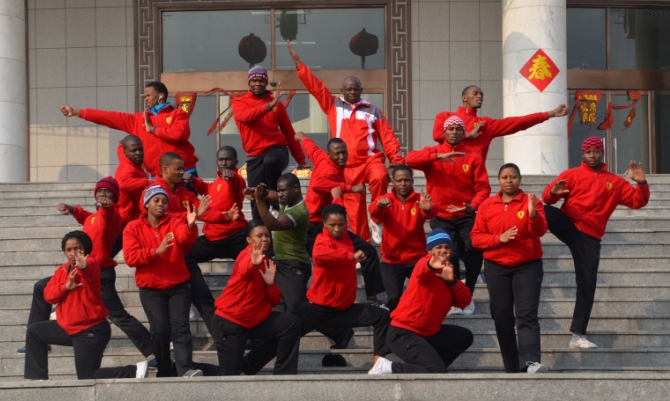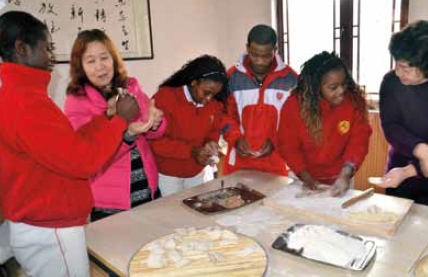| 
After the culmination of a memorable martial arts performance, Zimbabwean Medembo Uesebia and her classmates end up in a close embrace, celebrating their graduation from a famous Chinese martial arts school. Huo Yuanjia Culture and Wushu School, located inTianjin, the birthplace ofwushu(Chinese martial arts) master Huo Yuanjia, has produced manywushuchampions. As part of the cultural exchange program betweenChinaand Africa, the school provides a three-month training course. Starting in January, this course consists of 30 Zimbabwean students who predominantly ply their trade as teachers of physical education. Uesebia, one of the graduates, shared the details of her time studying inChina withChinAfrica.
ChinAfrica:What made you come toChinato learn martial arts?
Medembo Uesebia:I saw martial arts when I was too young so I didn’t know what it was. I was just watching action movies with Bruce Lee and Jacky Chan. Then I went to college to study sports. That’s when I got to know that it’s called martial arts. Then I realized that there are different types of martial arts.
Last year, I got an opportunity when I was teaching in school. A Chinese guy, Wu Demin, from Foshan City inChina, came toZimbabwe. He came and conducted a one-month workshop and I attended. That’s how I was selected to come toChina. Thanks to that, we have already learned a little bit inZimbabwe, and I fell in love withwushusince that time. So I decided to come and train further.
Is the martial arts technique you learned inChinathe same as you imagined?
My imagination of martial arts, before I really got to know it, is about fighting or military. But when I came here to learn it, I realized that there are different forms ofwushu. There’s something for the military indeed, but the non-contactwushuwe learned here is not about fighting, but being disciplined. The main idea of martial arts,wushu, is to keep your body fit, refresh your mind and keep yourself young. Learning some of these routines is not that easy. It needs dedication and team spirit.

What’s been the most difficult part of your study here?
The only difficulty that I had was adjusting to the environment ofChina. The first month here was very difficult, because, you know, Africa is warm, but inChina, especially inTianjin, it’s really cold in winter. So that climate change made us sick sometimes. But I’m happy I managed to adjust. After the first month, we were already fully adjusted.
And another challenge was some of the food that we are not used to, like crabs. In our country there’s nothing like that. But the school was good, and they did some surveys and managed to provide us with most of the food that we eat inZimbabwe- like beef, pork and chicken. So I’m happy here.
Besides studyingwushu, can you tell us more about your experiences during the three months you’ve spent here?
This is my first time inChina, and I’m so happy about being here. We celebrated Christmas inChina. It’s my first time to celebrate Christmas outside my country. It was a bit different. InChina, they celebrated the Spring Festival instead of Christmas, so not everyone was in that celebratory mood like the one we have when we are home. But we still had the chance to enjoy the celebration during Spring Festival. During the festival I really had fun. I learned a lot, like making dumplings and paper-cutting. And I really love that.
And I got to understand much more about Chinese culture than before. When you don’t know something about a place or you have never been somewhere, you just imagine things or you just believe in what you have been told. But now I have a different perception. The good thing aboutChinais that it’s an economically developed country and it has good business opportunities as well, not onlywushu. So many things inChinaare amazing.Zimbabweis far away fromChina, and it’s always great to learn about a country so different from your own.
|